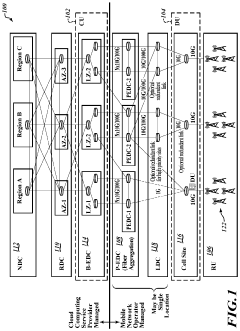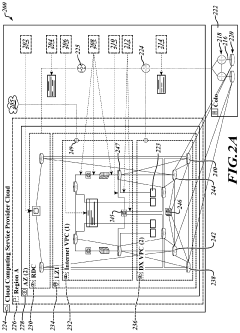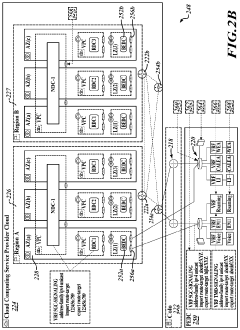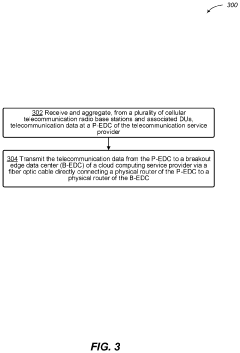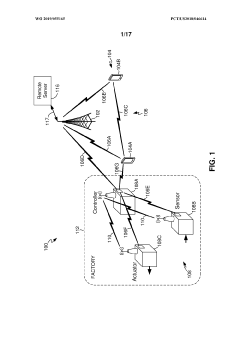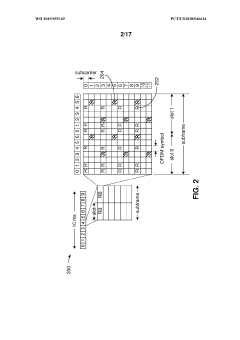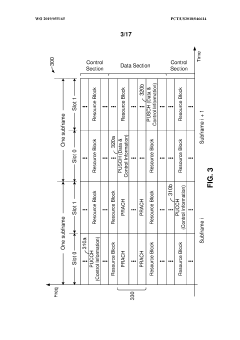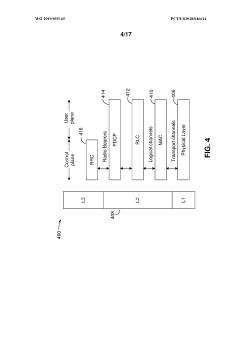What are the Benefits of 5G UC for Enhanced Remote Legal Services?
JUL 18, 20259 MIN READ
Generate Your Research Report Instantly with AI Agent
Patsnap Eureka helps you evaluate technical feasibility & market potential.
5G UC Legal Tech Evolution
The evolution of 5G UC (Ultra-Capacity) technology in the legal sector represents a significant leap forward in remote legal services. This technological advancement has been driven by the increasing demand for more efficient, secure, and accessible legal services, especially in the wake of global events that have accelerated the need for remote work solutions.
The journey of 5G UC in legal tech began with the broader implementation of 5G networks, which provided the foundation for ultra-fast, low-latency communications. As 5G infrastructure expanded, the legal industry recognized the potential for transforming traditional practices. The initial focus was on improving video conferencing capabilities, enabling high-quality, real-time communication between lawyers and clients, regardless of their physical locations.
As the technology matured, the legal sector saw the emergence of more sophisticated applications. Virtual courtrooms became a reality, allowing for remote hearings and trials with seamless audio and video quality. This not only increased the efficiency of legal proceedings but also improved access to justice for individuals in remote areas or with mobility limitations.
The integration of 5G UC with other emerging technologies marked another significant milestone. Artificial Intelligence (AI) and Machine Learning (ML) systems, powered by the high-speed, high-capacity networks, began to offer real-time language translation, document analysis, and even predictive legal analytics. This convergence of technologies dramatically enhanced the capabilities of legal professionals working remotely.
Data security and privacy concerns were addressed through the development of advanced encryption protocols specifically designed for 5G UC networks. This was crucial for the legal industry, where confidentiality is paramount. The improved security measures allowed for the safe transmission of sensitive legal documents and communications, fostering trust in remote legal services.
The most recent phase of 5G UC legal tech evolution has seen the rise of immersive technologies. Augmented Reality (AR) and Virtual Reality (VR) applications, leveraging the high bandwidth of 5G UC, are now being used for virtual site inspections, evidence recreation, and even jury selection processes. These tools provide legal professionals with new ways to present complex information and conduct remote investigations.
Looking ahead, the trajectory of 5G UC in legal tech points towards even greater integration of AI-driven legal assistants, blockchain for secure document management, and the potential for quantum-encrypted communications. These advancements promise to further revolutionize the practice of law, making it more accessible, efficient, and technologically sophisticated than ever before.
The journey of 5G UC in legal tech began with the broader implementation of 5G networks, which provided the foundation for ultra-fast, low-latency communications. As 5G infrastructure expanded, the legal industry recognized the potential for transforming traditional practices. The initial focus was on improving video conferencing capabilities, enabling high-quality, real-time communication between lawyers and clients, regardless of their physical locations.
As the technology matured, the legal sector saw the emergence of more sophisticated applications. Virtual courtrooms became a reality, allowing for remote hearings and trials with seamless audio and video quality. This not only increased the efficiency of legal proceedings but also improved access to justice for individuals in remote areas or with mobility limitations.
The integration of 5G UC with other emerging technologies marked another significant milestone. Artificial Intelligence (AI) and Machine Learning (ML) systems, powered by the high-speed, high-capacity networks, began to offer real-time language translation, document analysis, and even predictive legal analytics. This convergence of technologies dramatically enhanced the capabilities of legal professionals working remotely.
Data security and privacy concerns were addressed through the development of advanced encryption protocols specifically designed for 5G UC networks. This was crucial for the legal industry, where confidentiality is paramount. The improved security measures allowed for the safe transmission of sensitive legal documents and communications, fostering trust in remote legal services.
The most recent phase of 5G UC legal tech evolution has seen the rise of immersive technologies. Augmented Reality (AR) and Virtual Reality (VR) applications, leveraging the high bandwidth of 5G UC, are now being used for virtual site inspections, evidence recreation, and even jury selection processes. These tools provide legal professionals with new ways to present complex information and conduct remote investigations.
Looking ahead, the trajectory of 5G UC in legal tech points towards even greater integration of AI-driven legal assistants, blockchain for secure document management, and the potential for quantum-encrypted communications. These advancements promise to further revolutionize the practice of law, making it more accessible, efficient, and technologically sophisticated than ever before.
Remote Legal Services Demand
The demand for remote legal services has been steadily increasing in recent years, driven by technological advancements and changing client expectations. This trend has been further accelerated by global events such as the COVID-19 pandemic, which necessitated rapid adoption of remote work solutions across various industries, including the legal sector.
Law firms and legal service providers are experiencing a growing need for efficient, secure, and reliable remote communication and collaboration tools. Clients now expect seamless access to legal services from anywhere, at any time, without compromising on the quality of service or confidentiality of their sensitive information.
The rise of digital transformation in the legal industry has created a significant market for remote legal services. This includes virtual consultations, online document review and signing, remote court appearances, and secure file sharing. As a result, there is an increasing demand for technologies that can support these services effectively.
One of the key drivers of this demand is the need for improved accessibility to legal services. Remote solutions allow law firms to extend their reach beyond geographical boundaries, serving clients in different locations without the need for physical presence. This not only expands the potential client base for legal practitioners but also provides greater access to legal expertise for individuals and businesses in underserved areas.
Cost-effectiveness is another factor contributing to the growing demand for remote legal services. Both law firms and clients can benefit from reduced travel expenses, lower overhead costs, and increased efficiency in service delivery. This has led to a shift in the traditional billable hours model, with more firms exploring alternative fee arrangements and value-based pricing structures.
The demand for remote legal services also stems from the need for enhanced collaboration and knowledge sharing within legal teams. With legal professionals often working across different locations or time zones, there is a growing requirement for tools that facilitate real-time communication, document sharing, and project management.
Security and compliance considerations are paramount in the legal industry, creating a demand for remote solutions that can ensure the confidentiality and integrity of sensitive client information. This includes secure video conferencing platforms, encrypted file sharing systems, and robust identity verification methods.
As the legal industry continues to evolve, the demand for remote legal services is expected to grow further. This presents significant opportunities for technology providers to develop innovative solutions that address the specific needs of the legal sector, particularly in areas such as artificial intelligence-powered legal research, blockchain-based smart contracts, and advanced data analytics for case management.
Law firms and legal service providers are experiencing a growing need for efficient, secure, and reliable remote communication and collaboration tools. Clients now expect seamless access to legal services from anywhere, at any time, without compromising on the quality of service or confidentiality of their sensitive information.
The rise of digital transformation in the legal industry has created a significant market for remote legal services. This includes virtual consultations, online document review and signing, remote court appearances, and secure file sharing. As a result, there is an increasing demand for technologies that can support these services effectively.
One of the key drivers of this demand is the need for improved accessibility to legal services. Remote solutions allow law firms to extend their reach beyond geographical boundaries, serving clients in different locations without the need for physical presence. This not only expands the potential client base for legal practitioners but also provides greater access to legal expertise for individuals and businesses in underserved areas.
Cost-effectiveness is another factor contributing to the growing demand for remote legal services. Both law firms and clients can benefit from reduced travel expenses, lower overhead costs, and increased efficiency in service delivery. This has led to a shift in the traditional billable hours model, with more firms exploring alternative fee arrangements and value-based pricing structures.
The demand for remote legal services also stems from the need for enhanced collaboration and knowledge sharing within legal teams. With legal professionals often working across different locations or time zones, there is a growing requirement for tools that facilitate real-time communication, document sharing, and project management.
Security and compliance considerations are paramount in the legal industry, creating a demand for remote solutions that can ensure the confidentiality and integrity of sensitive client information. This includes secure video conferencing platforms, encrypted file sharing systems, and robust identity verification methods.
As the legal industry continues to evolve, the demand for remote legal services is expected to grow further. This presents significant opportunities for technology providers to develop innovative solutions that address the specific needs of the legal sector, particularly in areas such as artificial intelligence-powered legal research, blockchain-based smart contracts, and advanced data analytics for case management.
5G UC Challenges in Law
The integration of 5G UC (Ultra-Capacity) technology in the legal sector presents several significant challenges that need to be addressed for successful implementation and adoption. One of the primary obstacles is the substantial infrastructure investment required to deploy 5G UC networks. Law firms and legal institutions must allocate considerable resources to upgrade their existing systems and hardware to fully leverage the benefits of 5G UC technology.
Security and privacy concerns pose another critical challenge in the legal industry, where confidentiality is paramount. The increased data transmission speeds and capacity of 5G UC networks may potentially expose sensitive legal information to new vulnerabilities. Implementing robust encryption protocols and secure communication channels becomes crucial to safeguard client data and maintain attorney-client privilege.
Interoperability issues between legacy systems and new 5G UC-enabled technologies can hinder seamless integration within existing legal workflows. Many law firms rely on established software and databases that may not be immediately compatible with 5G UC capabilities, necessitating extensive system upgrades or replacements.
The digital divide presents a significant challenge in the legal sector, as not all clients or legal professionals may have equal access to 5G UC technology. This disparity could potentially create inequalities in the delivery of legal services, particularly in rural or underserved areas where 5G infrastructure may be limited.
Training and adaptation of legal professionals to effectively utilize 5G UC technology in their practice is another hurdle. Many lawyers and support staff may require extensive training to fully leverage the advanced features and capabilities offered by 5G UC, potentially leading to initial productivity losses and resistance to change.
Regulatory compliance and ethical considerations surrounding the use of 5G UC in legal services present additional challenges. As the technology enables more advanced remote services and data processing capabilities, legal professionals must navigate complex regulatory frameworks to ensure compliance with data protection laws and professional ethics guidelines.
Lastly, the potential for technology dependence and the need for contingency planning pose challenges for the legal sector. As legal services become increasingly reliant on 5G UC technology, firms must develop robust backup systems and protocols to maintain operations in the event of network outages or technical failures, ensuring continuity of critical legal services.
Security and privacy concerns pose another critical challenge in the legal industry, where confidentiality is paramount. The increased data transmission speeds and capacity of 5G UC networks may potentially expose sensitive legal information to new vulnerabilities. Implementing robust encryption protocols and secure communication channels becomes crucial to safeguard client data and maintain attorney-client privilege.
Interoperability issues between legacy systems and new 5G UC-enabled technologies can hinder seamless integration within existing legal workflows. Many law firms rely on established software and databases that may not be immediately compatible with 5G UC capabilities, necessitating extensive system upgrades or replacements.
The digital divide presents a significant challenge in the legal sector, as not all clients or legal professionals may have equal access to 5G UC technology. This disparity could potentially create inequalities in the delivery of legal services, particularly in rural or underserved areas where 5G infrastructure may be limited.
Training and adaptation of legal professionals to effectively utilize 5G UC technology in their practice is another hurdle. Many lawyers and support staff may require extensive training to fully leverage the advanced features and capabilities offered by 5G UC, potentially leading to initial productivity losses and resistance to change.
Regulatory compliance and ethical considerations surrounding the use of 5G UC in legal services present additional challenges. As the technology enables more advanced remote services and data processing capabilities, legal professionals must navigate complex regulatory frameworks to ensure compliance with data protection laws and professional ethics guidelines.
Lastly, the potential for technology dependence and the need for contingency planning pose challenges for the legal sector. As legal services become increasingly reliant on 5G UC technology, firms must develop robust backup systems and protocols to maintain operations in the event of network outages or technical failures, ensuring continuity of critical legal services.
Current 5G UC Legal Solutions
01 Increased data transmission speeds
5G Ultra Capacity (UC) offers significantly faster data transmission speeds compared to previous generations of cellular networks. This enables quicker downloads, smoother streaming, and improved real-time communication for users.- Increased data speeds and capacity: 5G Ultra Capacity (UC) offers significantly faster data speeds and increased network capacity compared to previous generations. This enables users to experience seamless streaming, faster downloads, and improved overall performance for data-intensive applications.
- Enhanced network efficiency and reliability: 5G UC utilizes advanced technologies to improve network efficiency and reliability. This includes better spectrum utilization, reduced latency, and improved signal strength, resulting in a more stable and responsive network experience for users.
- Support for emerging technologies: The increased capabilities of 5G UC enable support for emerging technologies such as augmented reality (AR), virtual reality (VR), Internet of Things (IoT) devices, and autonomous vehicles. This opens up new possibilities for innovation across various industries.
- Improved energy efficiency: 5G UC incorporates energy-saving features and optimizations that lead to improved battery life for mobile devices and reduced power consumption for network infrastructure, contributing to more sustainable and eco-friendly operations.
- Enhanced network slicing and customization: 5G UC allows for more advanced network slicing capabilities, enabling operators to create customized virtual networks tailored to specific use cases or industries. This results in optimized performance and resource allocation for diverse applications and services.
02 Enhanced network capacity and reduced latency
5G UC provides increased network capacity, allowing for more simultaneous connections and reduced latency. This improvement enables better performance for applications requiring real-time responsiveness, such as online gaming and virtual reality experiences.Expand Specific Solutions03 Improved IoT connectivity
The Ultra Capacity of 5G networks supports a higher density of connected devices, making it ideal for Internet of Things (IoT) applications. This enables more efficient smart city implementations, industrial automation, and connected vehicle technologies.Expand Specific Solutions04 Advanced network slicing capabilities
5G UC allows for more sophisticated network slicing, enabling operators to create virtual networks tailored to specific use cases or customer requirements. This feature enhances service quality and resource allocation for diverse applications and industries.Expand Specific Solutions05 Energy efficiency and coverage improvements
5G Ultra Capacity networks offer improved energy efficiency in data transmission and better coverage in urban and rural areas. This leads to extended battery life for devices and more reliable connectivity across diverse geographical locations.Expand Specific Solutions
Key 5G UC Legal Players
The 5G UC technology for enhanced remote legal services is in its early development stage, with the market poised for significant growth. The competitive landscape is characterized by a mix of established telecommunications giants and innovative startups. Companies like Huawei, Nokia, Ericsson, and Samsung are leading the charge in developing 5G infrastructure, while specialized firms such as DISH Wireless and Iplook are focusing on tailored solutions for legal services. The technology's maturity is rapidly advancing, with major players investing heavily in research and development to improve network capabilities, security, and reliability. As the market expands, we can expect increased competition and collaboration between tech companies and legal service providers to create comprehensive, industry-specific 5G UC solutions.
Samsung Electronics Co., Ltd.
Technical Solution: Samsung's 5G UC solution for enhanced remote legal services focuses on device-level optimization and seamless integration with their ecosystem. The system leverages Samsung's advanced OLED display technology to provide high-fidelity video conferencing, crucial for observing non-verbal cues in legal interactions[10]. Samsung's platform incorporates Knox security framework, offering hardware-level encryption for sensitive legal documents. The solution features AI-enhanced noise cancellation, ensuring clear audio during remote depositions or client meetings. Samsung's 5G UC technology enables rapid, secure file transfers of large legal documents and evidence, utilizing their advanced mmWave capabilities[11]. The system also integrates with Samsung's S Pen technology, allowing for precise digital signatures and document annotations on mobile devices.
Strengths: Excellent device integration, superior display technology, and robust mobile security features. Weaknesses: Potential ecosystem lock-in and limited customization options for specialized legal applications.
Huawei Technologies Co., Ltd.
Technical Solution: Huawei's 5G UC (Ultra-Capacity) solution for enhanced remote legal services leverages advanced network slicing and edge computing technologies. The system provides dedicated network slices for legal applications, ensuring high-quality, low-latency video conferencing and secure document sharing. Huawei's 5G UC incorporates AI-powered real-time language translation, enabling seamless communication between international legal teams[1]. The solution also integrates blockchain technology for tamper-proof record-keeping and smart contracts execution[3]. Huawei's 5G UC platform supports virtual reality (VR) courtroom simulations, allowing lawyers to prepare more effectively for trials[5].
Strengths: Comprehensive ecosystem integration, advanced AI capabilities, and robust security features. Weaknesses: Potential concerns over data privacy and reliance on Huawei's proprietary technologies.
Core 5G UC Legal Innovations
Systems and methods for a pass-through edge data center (p-EDC) in a wireless telecommunication network
PatentPendingUS20230328590A1
Innovation
- The implementation of a pass-through edge data center (P-EDC) system that aggregates telecommunication data from 5G NR radio base stations and distributed units, transmitting it via fiber optic cables to a breakout edge data center hosted by a cloud computing service provider, enabling efficient data routing and reducing latency through a cloud-native, service-based architecture.
System and method for communication on licensed communication spectrum and unlicensed communication spectrum
PatentWO2019055165A1
Innovation
- Implementing a method where devices can switch to licensed frequency bands if communication on unlicensed bands fails, by sending a scheduling request to a base station for resource allocation, allowing seamless communication between devices on licensed bands.
5G UC Legal Data Security
The implementation of 5G UC (Ultra-Capacity) technology in remote legal services brings significant advancements in data security, a critical aspect for the legal industry. 5G UC's enhanced capabilities provide a robust foundation for securing sensitive legal information during remote operations.
One of the primary benefits of 5G UC for legal data security is its improved encryption capabilities. The technology utilizes advanced encryption algorithms and protocols, ensuring that confidential client information, case details, and legal documents remain protected during transmission and storage. This enhanced encryption significantly reduces the risk of data breaches and unauthorized access, which is crucial for maintaining client trust and complying with legal ethics requirements.
5G UC also offers enhanced network slicing capabilities, allowing for the creation of dedicated, isolated network segments for legal services. This feature enables law firms and legal departments to establish secure, private networks for handling sensitive data, separate from other network traffic. By isolating legal data on its own network slice, the risk of cross-contamination or unauthorized access from other network users is minimized.
The increased bandwidth and lower latency of 5G UC contribute to more efficient and secure data backup and recovery processes. Legal firms can implement real-time data replication and backup strategies, ensuring that critical information is continuously protected and readily available in case of system failures or cyber attacks. This capability is particularly valuable for maintaining business continuity and protecting against data loss in remote legal service environments.
5G UC's improved network reliability and stability also play a crucial role in maintaining data integrity during remote legal proceedings. The technology's ability to handle high-volume data transfers with minimal interruptions ensures that video conferencing, document sharing, and real-time collaboration tools used in remote legal services operate smoothly and securely. This reliability reduces the risk of data corruption or loss during critical legal processes.
Furthermore, 5G UC enables more sophisticated authentication and access control mechanisms. The technology supports advanced biometric authentication methods and multi-factor authentication protocols, providing an additional layer of security for accessing legal data and systems remotely. This enhanced authentication helps prevent unauthorized access and ensures that only authorized personnel can interact with sensitive legal information.
The implementation of 5G UC also facilitates improved monitoring and threat detection capabilities for legal data security. The technology's high-speed, low-latency characteristics allow for real-time analysis of network traffic and user behavior, enabling faster detection and response to potential security threats. This proactive approach to security is essential for protecting legal data in an increasingly complex and evolving threat landscape.
One of the primary benefits of 5G UC for legal data security is its improved encryption capabilities. The technology utilizes advanced encryption algorithms and protocols, ensuring that confidential client information, case details, and legal documents remain protected during transmission and storage. This enhanced encryption significantly reduces the risk of data breaches and unauthorized access, which is crucial for maintaining client trust and complying with legal ethics requirements.
5G UC also offers enhanced network slicing capabilities, allowing for the creation of dedicated, isolated network segments for legal services. This feature enables law firms and legal departments to establish secure, private networks for handling sensitive data, separate from other network traffic. By isolating legal data on its own network slice, the risk of cross-contamination or unauthorized access from other network users is minimized.
The increased bandwidth and lower latency of 5G UC contribute to more efficient and secure data backup and recovery processes. Legal firms can implement real-time data replication and backup strategies, ensuring that critical information is continuously protected and readily available in case of system failures or cyber attacks. This capability is particularly valuable for maintaining business continuity and protecting against data loss in remote legal service environments.
5G UC's improved network reliability and stability also play a crucial role in maintaining data integrity during remote legal proceedings. The technology's ability to handle high-volume data transfers with minimal interruptions ensures that video conferencing, document sharing, and real-time collaboration tools used in remote legal services operate smoothly and securely. This reliability reduces the risk of data corruption or loss during critical legal processes.
Furthermore, 5G UC enables more sophisticated authentication and access control mechanisms. The technology supports advanced biometric authentication methods and multi-factor authentication protocols, providing an additional layer of security for accessing legal data and systems remotely. This enhanced authentication helps prevent unauthorized access and ensures that only authorized personnel can interact with sensitive legal information.
The implementation of 5G UC also facilitates improved monitoring and threat detection capabilities for legal data security. The technology's high-speed, low-latency characteristics allow for real-time analysis of network traffic and user behavior, enabling faster detection and response to potential security threats. This proactive approach to security is essential for protecting legal data in an increasingly complex and evolving threat landscape.
5G UC Legal Ethics Issues
The integration of 5G UC (Ultra-Capacity) technology in remote legal services brings forth a range of ethical considerations that legal professionals must navigate. As the legal industry increasingly adopts advanced communication technologies, it is crucial to address the potential ethical challenges that may arise.
Confidentiality and data security are paramount concerns in legal practice. 5G UC's enhanced bandwidth and low latency capabilities enable the transmission of large volumes of sensitive client information at unprecedented speeds. This raises questions about the adequacy of existing data protection measures and the need for more robust encryption protocols to safeguard client confidentiality in high-speed, high-volume data transfers.
The increased reliance on remote communication platforms powered by 5G UC also necessitates a reevaluation of attorney-client privilege. Legal professionals must ensure that the virtual environments used for client consultations and case discussions maintain the same level of privacy and security as traditional in-person meetings. This includes addressing potential vulnerabilities in network infrastructure and implementing strict access controls to prevent unauthorized interception of privileged communications.
Ethical considerations extend to the equitable access to legal services. While 5G UC technology has the potential to expand the reach of legal assistance, it may also exacerbate existing digital divides. Legal practitioners must be mindful of potential disparities in access to high-speed internet and advanced devices, ensuring that the adoption of 5G-enabled services does not inadvertently discriminate against or exclude certain segments of the population from accessing legal representation.
The use of AI-powered legal tools, facilitated by 5G UC's enhanced processing capabilities, raises questions about the ethical implications of automated decision-making in legal contexts. Legal professionals must carefully consider the balance between leveraging AI for efficiency and maintaining human oversight to ensure fair and just outcomes. This includes addressing potential biases in AI algorithms and maintaining transparency in the use of automated systems in legal processes.
Furthermore, the rapid pace of technological advancement enabled by 5G UC may challenge existing ethical guidelines and professional conduct rules. Legal practitioners and regulatory bodies must proactively adapt and update ethical frameworks to address emerging issues related to remote practice, digital evidence handling, and the use of advanced technologies in legal proceedings.
Lastly, the increased connectivity and real-time collaboration capabilities of 5G UC raise questions about work-life balance and professional boundaries for legal professionals. The ability to be constantly connected may blur the lines between personal and professional time, potentially leading to ethical dilemmas related to client expectations, response times, and the duty of care. Legal professionals must establish clear guidelines and boundaries to maintain ethical standards while leveraging the benefits of enhanced connectivity.
Confidentiality and data security are paramount concerns in legal practice. 5G UC's enhanced bandwidth and low latency capabilities enable the transmission of large volumes of sensitive client information at unprecedented speeds. This raises questions about the adequacy of existing data protection measures and the need for more robust encryption protocols to safeguard client confidentiality in high-speed, high-volume data transfers.
The increased reliance on remote communication platforms powered by 5G UC also necessitates a reevaluation of attorney-client privilege. Legal professionals must ensure that the virtual environments used for client consultations and case discussions maintain the same level of privacy and security as traditional in-person meetings. This includes addressing potential vulnerabilities in network infrastructure and implementing strict access controls to prevent unauthorized interception of privileged communications.
Ethical considerations extend to the equitable access to legal services. While 5G UC technology has the potential to expand the reach of legal assistance, it may also exacerbate existing digital divides. Legal practitioners must be mindful of potential disparities in access to high-speed internet and advanced devices, ensuring that the adoption of 5G-enabled services does not inadvertently discriminate against or exclude certain segments of the population from accessing legal representation.
The use of AI-powered legal tools, facilitated by 5G UC's enhanced processing capabilities, raises questions about the ethical implications of automated decision-making in legal contexts. Legal professionals must carefully consider the balance between leveraging AI for efficiency and maintaining human oversight to ensure fair and just outcomes. This includes addressing potential biases in AI algorithms and maintaining transparency in the use of automated systems in legal processes.
Furthermore, the rapid pace of technological advancement enabled by 5G UC may challenge existing ethical guidelines and professional conduct rules. Legal practitioners and regulatory bodies must proactively adapt and update ethical frameworks to address emerging issues related to remote practice, digital evidence handling, and the use of advanced technologies in legal proceedings.
Lastly, the increased connectivity and real-time collaboration capabilities of 5G UC raise questions about work-life balance and professional boundaries for legal professionals. The ability to be constantly connected may blur the lines between personal and professional time, potentially leading to ethical dilemmas related to client expectations, response times, and the duty of care. Legal professionals must establish clear guidelines and boundaries to maintain ethical standards while leveraging the benefits of enhanced connectivity.
Unlock deeper insights with Patsnap Eureka Quick Research — get a full tech report to explore trends and direct your research. Try now!
Generate Your Research Report Instantly with AI Agent
Supercharge your innovation with Patsnap Eureka AI Agent Platform!
